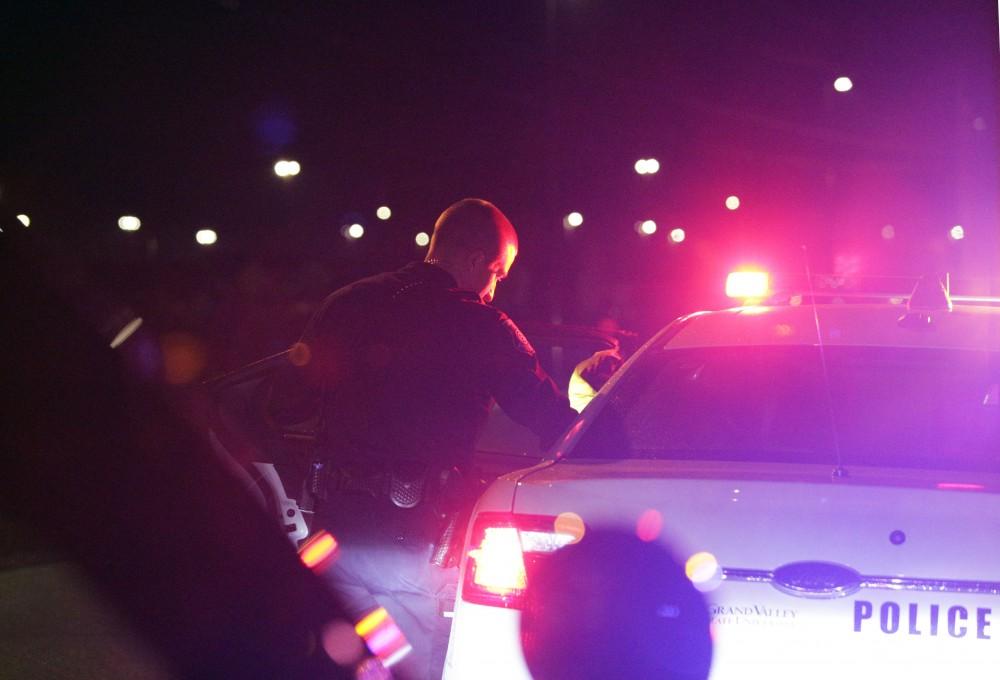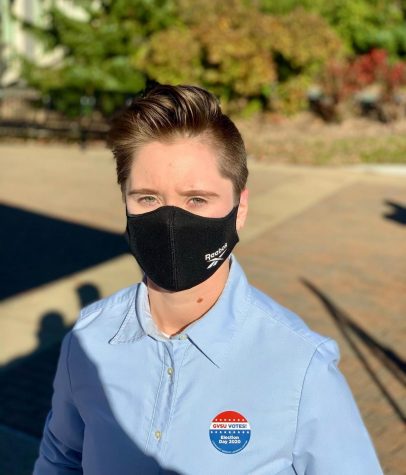Student Senate proposes change to university housing contract

Officer Seth Beelen places an individual in the police car on Saturday October 28, 2017. GVL / Archive
Jan 21, 2019
Grand Valley State University’s Student Senate has helped the university to include student input on campus policies through their involvement in passing proposals that help the university decide on changes made to the student living policies on campus, among other student-related issues. During their Jan. 10 general assembly, following a near-unanimous vote, the Student Senate passed a resolution for their support of a rewording of section 13 in GVSU’s on-campus housing contract.
Before the passing of the resolution, the section stated that the university has the right to enter living spaces of campus residents “without notice as allowed by the law.” The proposal’s amendment to section 13 elaborates on the circumstances in which the university can enter student living spaces such as inspections, safety, health, maintenance or a university code violation by a student. Additionally, the proposal states that the university may enter a room without warning in an emergency situation.
Associate Director for GVSU Housing and Residence Life Colleen Bailey explained that the proposal process included representatives from GVSU’s housing and facilities services. Bailey said that this proposal was an important one for the housing organization to be a part of, as it included changes to housing policies.
“As a leasing agent and property owner, GVSU housing must consider what is best for all students residing on campus, including routine health and safety checks, and regular maintenance or work order follow up in addition to addressing emergency concerns,” Bailey said.
The proposal changes will be reviewed in the coming weeks by GVSU to ensure it agrees with the university’s standards. Bailey has seen the important role that GVSU housing staff plays in maintaining the safety of students and believes in prioritizing safety as helpful when discussing student senate proposals that involve housing regulations.
“We are open to reviewing and considering senate’s recommendations in contract language changes,” Bailey said. “We will do so over the coming weeks with the University Counsel as there needs to be a balance in privacy and safety in the contract. We are reviewing contracts from other Michigan universities to see that we are in alignment with best practices.”
Among the contributors during the proposal process was the Grand Valley Police Department Capt. Jeff Stoll, who provided law enforcement insight and suggestions before and after the vote. Stoll believes that the proposal changes to section 13 will be beneficial to students, helping them to feel confident in their safety when living on campus.
Stoll is also the assistant director of GVSU’s department of public safety, and doesn’t think that the change will have any major pushback from students, nor that it would change the number of emergency responses that GVPD officers on campus currently respond to.
“We want to provide a safe environment for students and residents and do so while obeying the expectations of the law,” Stoll said.
“The number of times we enter a room for an emergency exception is relatively low. Entry to a room without notice is done only as a last resort, and even those times we do make entry, we are very clear prior to and during our initial entry that we are knocking and announcing our presence.”
Although the resolution passed nearly unanimously, one senator voted against the proposal, citing a lack of clarity on what is classified as an emergency in the wording. Currently, GVPD considers emergency situations to include times when someone is in danger due to a medical emergency or crime in progress.
Stoll clarified that common examples of emergency entries are fire alarm systems going off without prior warning, when people are unable to answer the door or a medical report when someone is unable to open the door for police. Both housing and GVPD want students to feel safe when living on campus to provide a comfortable living learning environment.
“We work hard to be sure that our rooms and buildings are as safe as possible and are intentional about being proactive, as well as responding to issues that are presented through the work order system,” Stoll said.


























